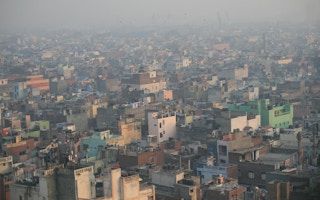With India just a few weeks away from the general elections, a new survey has shed light on what the country’s voters want.
The survey, released by the NGO Association for Democratic Reforms (ADR) on March 25, found that clean drinking water and agriculture-related governance issues feature prominently in the Indian voters’ list of priorities. High levels of water and air pollution, which have been plaguing Indian cities over the past few years, were not a top priority nationally but were of importance to the urban voters.
To see what Indian voters’ priorities are and what they think of the government’s performance on those issues, researchers surveyed a total of 273,487 people across 534 constituencies of the Lok Sabha, the lower house of the Parliament of India, between October and December 2018. At least 500 people were surveyed in each constituency. The 2019 Lok Sabha elections are scheduled to take place between April and May 2019.
Overall, the voters prioritised employment and basic amenities like healthcare, drinking water and better roads above all governance issues, including terrorism and the combination of a strong defense and military. Drinking water came in third (30.5 per cent of the respondents) behind employment and healthcare.
In fact, the survey noted that the importance of drinking water as a priority for voters this year increased by 150 per cent compared to 2017. However, when looking at rural areas alone, drinking water ranked seventh, after agricultural issues, which dominated voters’ priorities.
“Better roads” was ranked fourth, and “better public transport” ranked fifth in the national priority list, followed by the availability of water for agriculture, agriculture loan availability, higher price realisation for farm products and agriculture subsidy for seeds and fertilisers.
Addressing water and air pollution was a priority for less than 12 per cent of the voters in the survey, and the category ranked 17th in the list of 31 governance-related priorities. However, the issue of water and air pollution did feature in the top 10 priorities of surveyed voters in the urban areas.
Other environment-related concerns that found a place in the overall list of voters’ priorities include sand and stone quarrying (No. 15), traffic congestion (No. 16), river and lake pollution (No. 18) and noise pollution (No. 19). The issue of facilities for cyclists and pedestrians and garbage clearance also made the list at No. 22 (7.6 per cent) and No. 25 (6.61 per cent), respectively.
The majority of voters in India are from rural areas, with more than 300 of the 543 seats in the Lok Sabha from rural India. In these areas, better public transport, water, river and lake pollution, and garbage clearance were part of the voters’ priorities, ranking ninth, 12th and 21st, respectively.
The survey also analysed the voters’ perception of the government’s performance and found that “voters rated the performance of the government on all 31 listed governance issues as below average.” But the government’s worst performance, as rated by the voters, was on the issues of encroachment of public lands and lakes.
Environmental issues
In urban areas, environmental issues featured prominently in the voters’ priority list, after employment and healthcare. It’s estimated that urban and semi-urban areas account for about 200 of the 543 Lok Sabha seats.
Traffic congestion, drinking water, water and air pollution, better public transport and noise pollution were listed as some of the top 10 priorities of urban voters. These were followed by facilities for cyclists and pedestrians on roads (No. 11) and better garbage clearance (No. 17).
“Surprisingly, despite the scarcity of land in urban areas, encroachment of land, lakes etc. was not a priority for urban voters as it was ranked lowest at 1.26 per cent,” the survey said. In rural areas as well, this issue was ranked lowest in the list of issues that concern voters.
Drinking water came up as a significant priority for voters across the country, especially in the southern states of Karnataka, Andhra Pradesh and Kerala. The survey also noted that more than 163 million Indians do not have access to safe drinking water, according to a recent report of the comptroller and auditor general of India.
“All over India, 30.5 per cent voters consider drinking water as the third most important governance issue,” the survey said. “It is particularly higher for urban voters, voters from medium wealth group and for general category voters.”
The survey also noted that water is an essential resource for agriculture but has not been managed well in the Indian context, despite the country being an agricultural powerhouse.
“Problems of Indian agriculture are intricately linked to per-capita availability of water in a cost-effective manner since nearly 70 per cent of the net sown area is rain-dependent,” the survey said. “All over India, 26.40 per cent voters consider availability of water for agriculture as the sixth most important governance issue.”
Concern over water and air pollution, while not a national-level priority, was among the voters’ top three priorities in at least 45 constituencies across the country. In Delhi, however, where air pollution has been an important issue for years, surveyed voters in only four of the seven constituencies rated it among their top three priorities. Traffic congestion, in contrast, was a priority issue for all seven constituencies.
Noise pollution, which generally does not get as much attention as air or water pollution, was among the voters’ top three priorities in at least 20 constituencies in the country.
The 2018 survey is ADR’s third. The first such survey was conducted before the 2014 general elections, while the second one was carried out in 2016-17.
“In the series of surveys conducted by ADR, all point to the fact that voters’ priorities have remained unaddressed by the governments in power. A look at the key findings of the all-India survey 2018 highlights the fact that the voters’ expectations have clearly not been met,” the survey said.
This story was published with permission from Mongabay.com.










